Nursing Ethical Issues - Essay
VerifiedAdded on 2021/06/15
|8
|2134
|103
AI Summary
Contribute Materials
Your contribution can guide someone’s learning journey. Share your
documents today.

Running head: NURSING
Nursing
Name of the Student
Name of the University
Author note
Nursing
Name of the Student
Name of the University
Author note
Secure Best Marks with AI Grader
Need help grading? Try our AI Grader for instant feedback on your assignments.
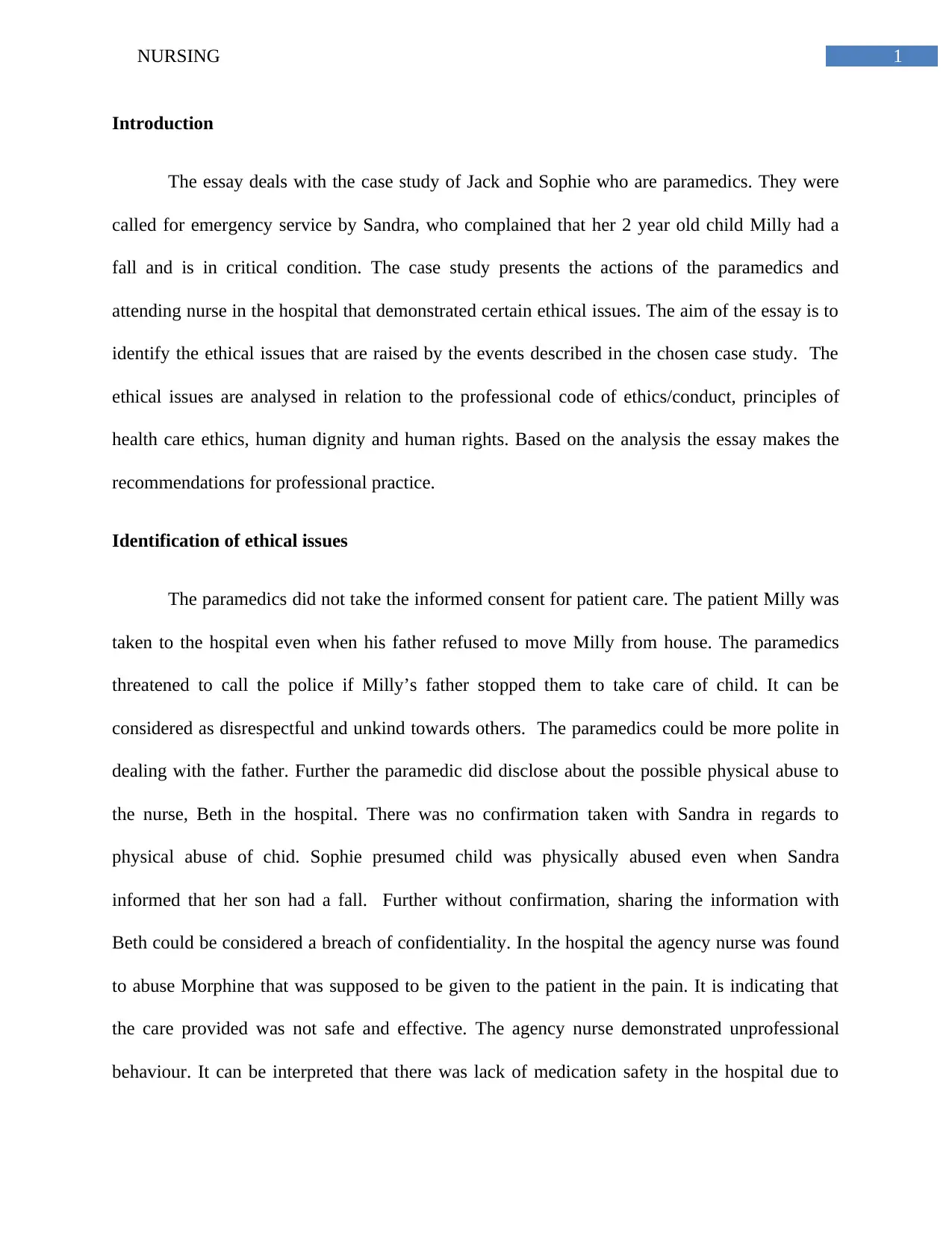
1NURSING
Introduction
The essay deals with the case study of Jack and Sophie who are paramedics. They were
called for emergency service by Sandra, who complained that her 2 year old child Milly had a
fall and is in critical condition. The case study presents the actions of the paramedics and
attending nurse in the hospital that demonstrated certain ethical issues. The aim of the essay is to
identify the ethical issues that are raised by the events described in the chosen case study. The
ethical issues are analysed in relation to the professional code of ethics/conduct, principles of
health care ethics, human dignity and human rights. Based on the analysis the essay makes the
recommendations for professional practice.
Identification of ethical issues
The paramedics did not take the informed consent for patient care. The patient Milly was
taken to the hospital even when his father refused to move Milly from house. The paramedics
threatened to call the police if Milly’s father stopped them to take care of child. It can be
considered as disrespectful and unkind towards others. The paramedics could be more polite in
dealing with the father. Further the paramedic did disclose about the possible physical abuse to
the nurse, Beth in the hospital. There was no confirmation taken with Sandra in regards to
physical abuse of chid. Sophie presumed child was physically abused even when Sandra
informed that her son had a fall. Further without confirmation, sharing the information with
Beth could be considered a breach of confidentiality. In the hospital the agency nurse was found
to abuse Morphine that was supposed to be given to the patient in the pain. It is indicating that
the care provided was not safe and effective. The agency nurse demonstrated unprofessional
behaviour. It can be interpreted that there was lack of medication safety in the hospital due to
Introduction
The essay deals with the case study of Jack and Sophie who are paramedics. They were
called for emergency service by Sandra, who complained that her 2 year old child Milly had a
fall and is in critical condition. The case study presents the actions of the paramedics and
attending nurse in the hospital that demonstrated certain ethical issues. The aim of the essay is to
identify the ethical issues that are raised by the events described in the chosen case study. The
ethical issues are analysed in relation to the professional code of ethics/conduct, principles of
health care ethics, human dignity and human rights. Based on the analysis the essay makes the
recommendations for professional practice.
Identification of ethical issues
The paramedics did not take the informed consent for patient care. The patient Milly was
taken to the hospital even when his father refused to move Milly from house. The paramedics
threatened to call the police if Milly’s father stopped them to take care of child. It can be
considered as disrespectful and unkind towards others. The paramedics could be more polite in
dealing with the father. Further the paramedic did disclose about the possible physical abuse to
the nurse, Beth in the hospital. There was no confirmation taken with Sandra in regards to
physical abuse of chid. Sophie presumed child was physically abused even when Sandra
informed that her son had a fall. Further without confirmation, sharing the information with
Beth could be considered a breach of confidentiality. In the hospital the agency nurse was found
to abuse Morphine that was supposed to be given to the patient in the pain. It is indicating that
the care provided was not safe and effective. The agency nurse demonstrated unprofessional
behaviour. It can be interpreted that there was lack of medication safety in the hospital due to
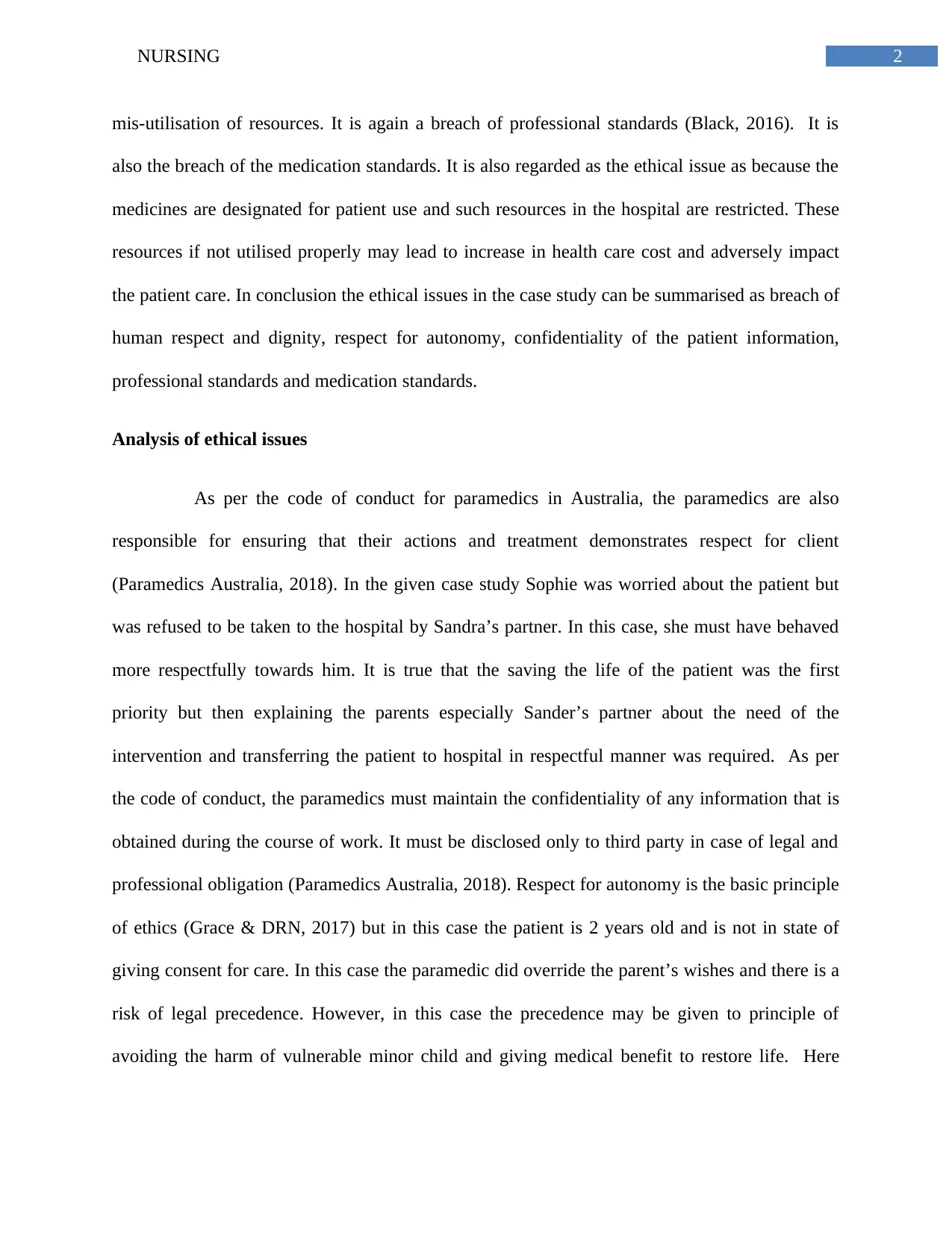
2NURSING
mis-utilisation of resources. It is again a breach of professional standards (Black, 2016). It is
also the breach of the medication standards. It is also regarded as the ethical issue as because the
medicines are designated for patient use and such resources in the hospital are restricted. These
resources if not utilised properly may lead to increase in health care cost and adversely impact
the patient care. In conclusion the ethical issues in the case study can be summarised as breach of
human respect and dignity, respect for autonomy, confidentiality of the patient information,
professional standards and medication standards.
Analysis of ethical issues
As per the code of conduct for paramedics in Australia, the paramedics are also
responsible for ensuring that their actions and treatment demonstrates respect for client
(Paramedics Australia, 2018). In the given case study Sophie was worried about the patient but
was refused to be taken to the hospital by Sandra’s partner. In this case, she must have behaved
more respectfully towards him. It is true that the saving the life of the patient was the first
priority but then explaining the parents especially Sander’s partner about the need of the
intervention and transferring the patient to hospital in respectful manner was required. As per
the code of conduct, the paramedics must maintain the confidentiality of any information that is
obtained during the course of work. It must be disclosed only to third party in case of legal and
professional obligation (Paramedics Australia, 2018). Respect for autonomy is the basic principle
of ethics (Grace & DRN, 2017) but in this case the patient is 2 years old and is not in state of
giving consent for care. In this case the paramedic did override the parent’s wishes and there is a
risk of legal precedence. However, in this case the precedence may be given to principle of
avoiding the harm of vulnerable minor child and giving medical benefit to restore life. Here
mis-utilisation of resources. It is again a breach of professional standards (Black, 2016). It is
also the breach of the medication standards. It is also regarded as the ethical issue as because the
medicines are designated for patient use and such resources in the hospital are restricted. These
resources if not utilised properly may lead to increase in health care cost and adversely impact
the patient care. In conclusion the ethical issues in the case study can be summarised as breach of
human respect and dignity, respect for autonomy, confidentiality of the patient information,
professional standards and medication standards.
Analysis of ethical issues
As per the code of conduct for paramedics in Australia, the paramedics are also
responsible for ensuring that their actions and treatment demonstrates respect for client
(Paramedics Australia, 2018). In the given case study Sophie was worried about the patient but
was refused to be taken to the hospital by Sandra’s partner. In this case, she must have behaved
more respectfully towards him. It is true that the saving the life of the patient was the first
priority but then explaining the parents especially Sander’s partner about the need of the
intervention and transferring the patient to hospital in respectful manner was required. As per
the code of conduct, the paramedics must maintain the confidentiality of any information that is
obtained during the course of work. It must be disclosed only to third party in case of legal and
professional obligation (Paramedics Australia, 2018). Respect for autonomy is the basic principle
of ethics (Grace & DRN, 2017) but in this case the patient is 2 years old and is not in state of
giving consent for care. In this case the paramedic did override the parent’s wishes and there is a
risk of legal precedence. However, in this case the precedence may be given to principle of
avoiding the harm of vulnerable minor child and giving medical benefit to restore life. Here
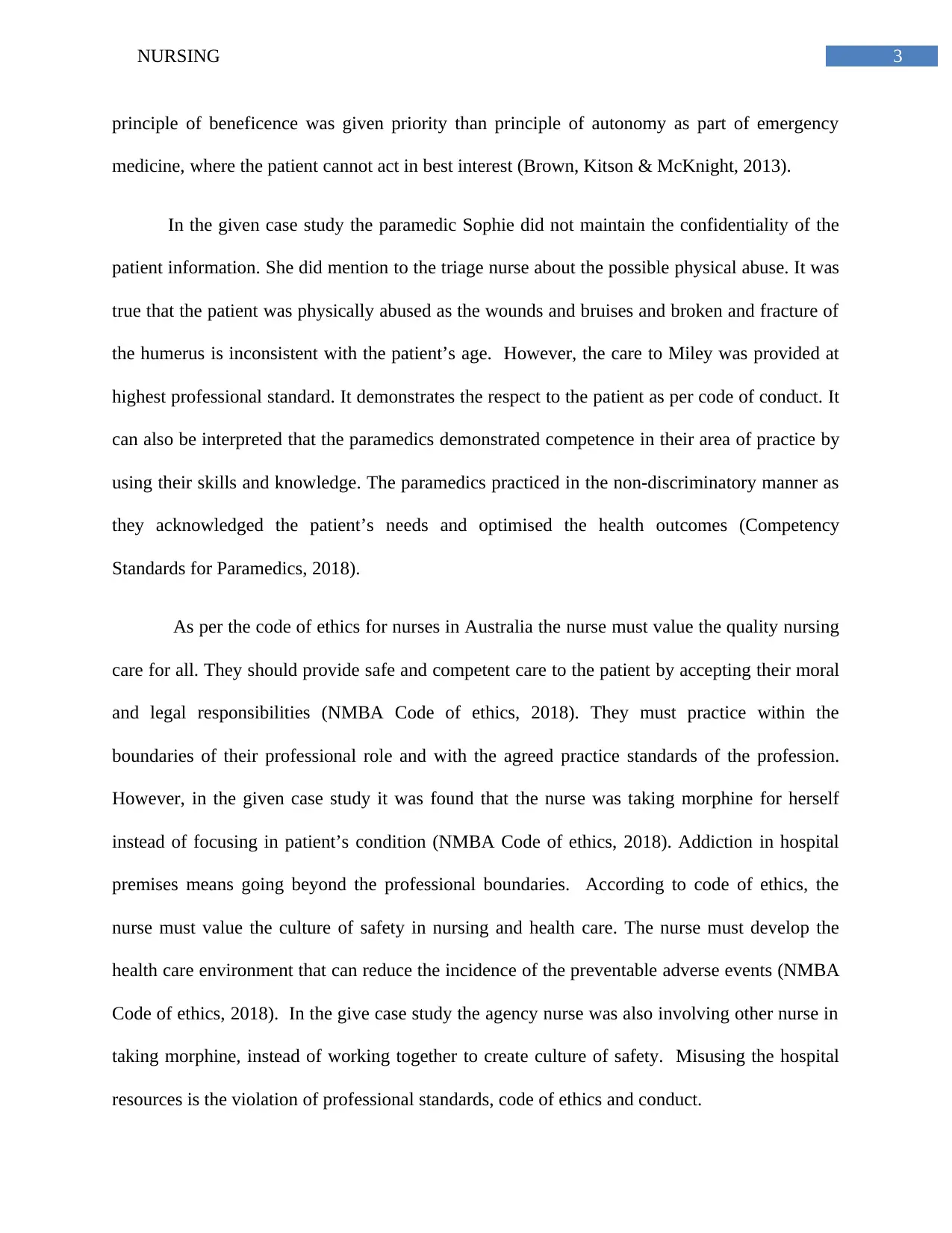
3NURSING
principle of beneficence was given priority than principle of autonomy as part of emergency
medicine, where the patient cannot act in best interest (Brown, Kitson & McKnight, 2013).
In the given case study the paramedic Sophie did not maintain the confidentiality of the
patient information. She did mention to the triage nurse about the possible physical abuse. It was
true that the patient was physically abused as the wounds and bruises and broken and fracture of
the humerus is inconsistent with the patient’s age. However, the care to Miley was provided at
highest professional standard. It demonstrates the respect to the patient as per code of conduct. It
can also be interpreted that the paramedics demonstrated competence in their area of practice by
using their skills and knowledge. The paramedics practiced in the non-discriminatory manner as
they acknowledged the patient’s needs and optimised the health outcomes (Competency
Standards for Paramedics, 2018).
As per the code of ethics for nurses in Australia the nurse must value the quality nursing
care for all. They should provide safe and competent care to the patient by accepting their moral
and legal responsibilities (NMBA Code of ethics, 2018). They must practice within the
boundaries of their professional role and with the agreed practice standards of the profession.
However, in the given case study it was found that the nurse was taking morphine for herself
instead of focusing in patient’s condition (NMBA Code of ethics, 2018). Addiction in hospital
premises means going beyond the professional boundaries. According to code of ethics, the
nurse must value the culture of safety in nursing and health care. The nurse must develop the
health care environment that can reduce the incidence of the preventable adverse events (NMBA
Code of ethics, 2018). In the give case study the agency nurse was also involving other nurse in
taking morphine, instead of working together to create culture of safety. Misusing the hospital
resources is the violation of professional standards, code of ethics and conduct.
principle of beneficence was given priority than principle of autonomy as part of emergency
medicine, where the patient cannot act in best interest (Brown, Kitson & McKnight, 2013).
In the given case study the paramedic Sophie did not maintain the confidentiality of the
patient information. She did mention to the triage nurse about the possible physical abuse. It was
true that the patient was physically abused as the wounds and bruises and broken and fracture of
the humerus is inconsistent with the patient’s age. However, the care to Miley was provided at
highest professional standard. It demonstrates the respect to the patient as per code of conduct. It
can also be interpreted that the paramedics demonstrated competence in their area of practice by
using their skills and knowledge. The paramedics practiced in the non-discriminatory manner as
they acknowledged the patient’s needs and optimised the health outcomes (Competency
Standards for Paramedics, 2018).
As per the code of ethics for nurses in Australia the nurse must value the quality nursing
care for all. They should provide safe and competent care to the patient by accepting their moral
and legal responsibilities (NMBA Code of ethics, 2018). They must practice within the
boundaries of their professional role and with the agreed practice standards of the profession.
However, in the given case study it was found that the nurse was taking morphine for herself
instead of focusing in patient’s condition (NMBA Code of ethics, 2018). Addiction in hospital
premises means going beyond the professional boundaries. According to code of ethics, the
nurse must value the culture of safety in nursing and health care. The nurse must develop the
health care environment that can reduce the incidence of the preventable adverse events (NMBA
Code of ethics, 2018). In the give case study the agency nurse was also involving other nurse in
taking morphine, instead of working together to create culture of safety. Misusing the hospital
resources is the violation of professional standards, code of ethics and conduct.
Secure Best Marks with AI Grader
Need help grading? Try our AI Grader for instant feedback on your assignments.
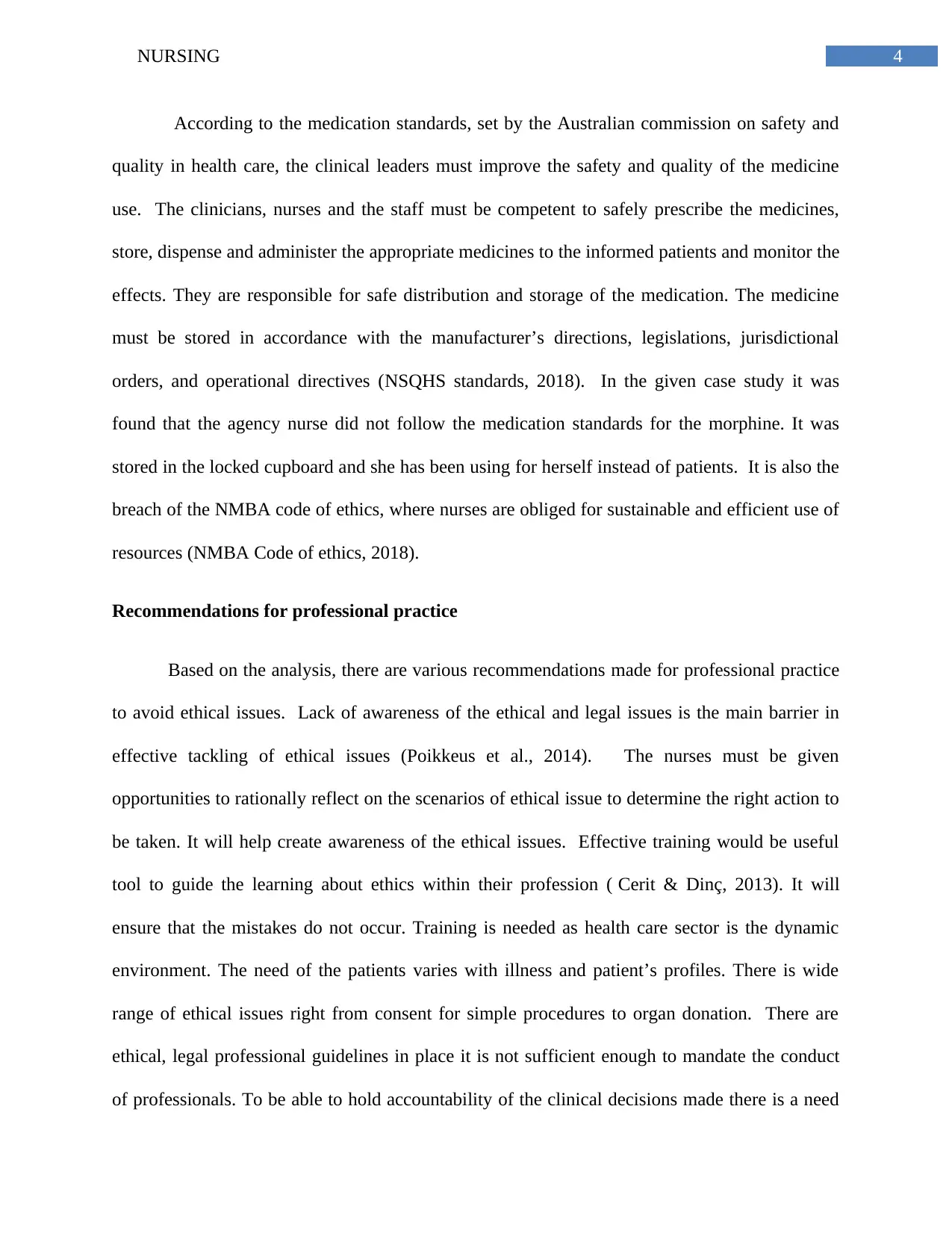
4NURSING
According to the medication standards, set by the Australian commission on safety and
quality in health care, the clinical leaders must improve the safety and quality of the medicine
use. The clinicians, nurses and the staff must be competent to safely prescribe the medicines,
store, dispense and administer the appropriate medicines to the informed patients and monitor the
effects. They are responsible for safe distribution and storage of the medication. The medicine
must be stored in accordance with the manufacturer’s directions, legislations, jurisdictional
orders, and operational directives (NSQHS standards, 2018). In the given case study it was
found that the agency nurse did not follow the medication standards for the morphine. It was
stored in the locked cupboard and she has been using for herself instead of patients. It is also the
breach of the NMBA code of ethics, where nurses are obliged for sustainable and efficient use of
resources (NMBA Code of ethics, 2018).
Recommendations for professional practice
Based on the analysis, there are various recommendations made for professional practice
to avoid ethical issues. Lack of awareness of the ethical and legal issues is the main barrier in
effective tackling of ethical issues (Poikkeus et al., 2014). The nurses must be given
opportunities to rationally reflect on the scenarios of ethical issue to determine the right action to
be taken. It will help create awareness of the ethical issues. Effective training would be useful
tool to guide the learning about ethics within their profession ( Cerit & Dinç, 2013). It will
ensure that the mistakes do not occur. Training is needed as health care sector is the dynamic
environment. The need of the patients varies with illness and patient’s profiles. There is wide
range of ethical issues right from consent for simple procedures to organ donation. There are
ethical, legal professional guidelines in place it is not sufficient enough to mandate the conduct
of professionals. To be able to hold accountability of the clinical decisions made there is a need
According to the medication standards, set by the Australian commission on safety and
quality in health care, the clinical leaders must improve the safety and quality of the medicine
use. The clinicians, nurses and the staff must be competent to safely prescribe the medicines,
store, dispense and administer the appropriate medicines to the informed patients and monitor the
effects. They are responsible for safe distribution and storage of the medication. The medicine
must be stored in accordance with the manufacturer’s directions, legislations, jurisdictional
orders, and operational directives (NSQHS standards, 2018). In the given case study it was
found that the agency nurse did not follow the medication standards for the morphine. It was
stored in the locked cupboard and she has been using for herself instead of patients. It is also the
breach of the NMBA code of ethics, where nurses are obliged for sustainable and efficient use of
resources (NMBA Code of ethics, 2018).
Recommendations for professional practice
Based on the analysis, there are various recommendations made for professional practice
to avoid ethical issues. Lack of awareness of the ethical and legal issues is the main barrier in
effective tackling of ethical issues (Poikkeus et al., 2014). The nurses must be given
opportunities to rationally reflect on the scenarios of ethical issue to determine the right action to
be taken. It will help create awareness of the ethical issues. Effective training would be useful
tool to guide the learning about ethics within their profession ( Cerit & Dinç, 2013). It will
ensure that the mistakes do not occur. Training is needed as health care sector is the dynamic
environment. The need of the patients varies with illness and patient’s profiles. There is wide
range of ethical issues right from consent for simple procedures to organ donation. There are
ethical, legal professional guidelines in place it is not sufficient enough to mandate the conduct
of professionals. To be able to hold accountability of the clinical decisions made there is a need
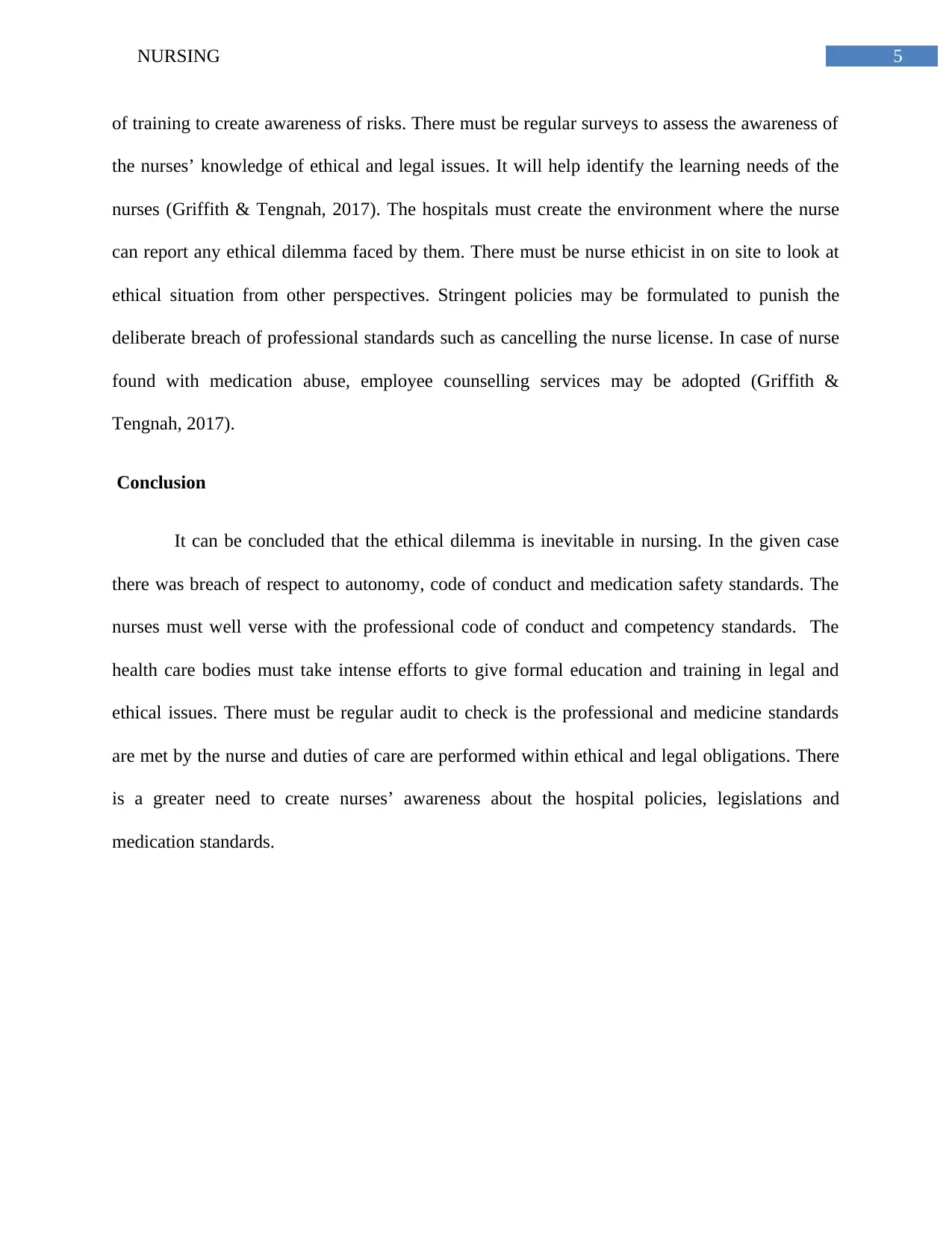
5NURSING
of training to create awareness of risks. There must be regular surveys to assess the awareness of
the nurses’ knowledge of ethical and legal issues. It will help identify the learning needs of the
nurses (Griffith & Tengnah, 2017). The hospitals must create the environment where the nurse
can report any ethical dilemma faced by them. There must be nurse ethicist in on site to look at
ethical situation from other perspectives. Stringent policies may be formulated to punish the
deliberate breach of professional standards such as cancelling the nurse license. In case of nurse
found with medication abuse, employee counselling services may be adopted (Griffith &
Tengnah, 2017).
Conclusion
It can be concluded that the ethical dilemma is inevitable in nursing. In the given case
there was breach of respect to autonomy, code of conduct and medication safety standards. The
nurses must well verse with the professional code of conduct and competency standards. The
health care bodies must take intense efforts to give formal education and training in legal and
ethical issues. There must be regular audit to check is the professional and medicine standards
are met by the nurse and duties of care are performed within ethical and legal obligations. There
is a greater need to create nurses’ awareness about the hospital policies, legislations and
medication standards.
of training to create awareness of risks. There must be regular surveys to assess the awareness of
the nurses’ knowledge of ethical and legal issues. It will help identify the learning needs of the
nurses (Griffith & Tengnah, 2017). The hospitals must create the environment where the nurse
can report any ethical dilemma faced by them. There must be nurse ethicist in on site to look at
ethical situation from other perspectives. Stringent policies may be formulated to punish the
deliberate breach of professional standards such as cancelling the nurse license. In case of nurse
found with medication abuse, employee counselling services may be adopted (Griffith &
Tengnah, 2017).
Conclusion
It can be concluded that the ethical dilemma is inevitable in nursing. In the given case
there was breach of respect to autonomy, code of conduct and medication safety standards. The
nurses must well verse with the professional code of conduct and competency standards. The
health care bodies must take intense efforts to give formal education and training in legal and
ethical issues. There must be regular audit to check is the professional and medicine standards
are met by the nurse and duties of care are performed within ethical and legal obligations. There
is a greater need to create nurses’ awareness about the hospital policies, legislations and
medication standards.
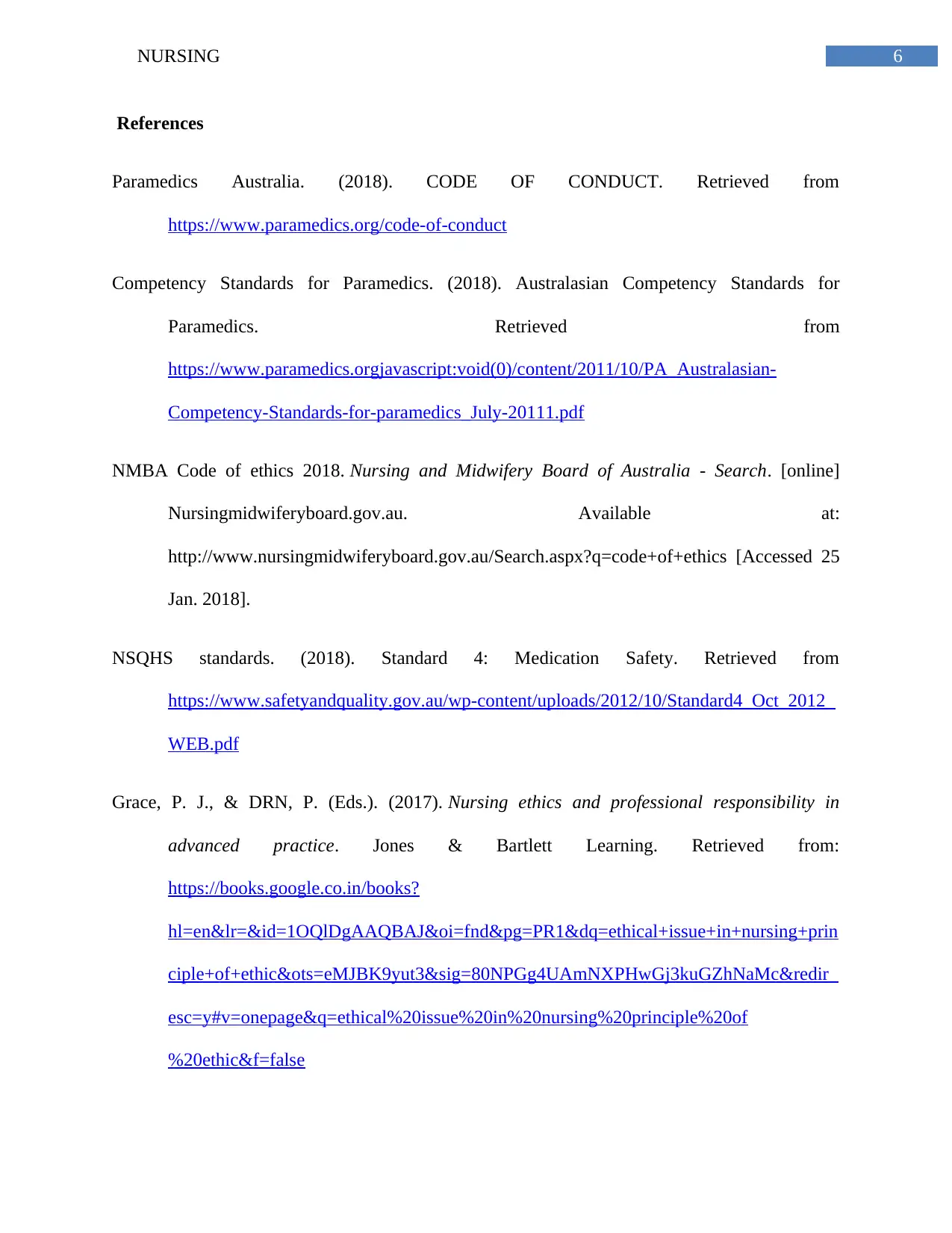
6NURSING
References
Paramedics Australia. (2018). CODE OF CONDUCT. Retrieved from
https://www.paramedics.org/code-of-conduct
Competency Standards for Paramedics. (2018). Australasian Competency Standards for
Paramedics. Retrieved from
https://www.paramedics.orgjavascript:void(0)/content/2011/10/PA_Australasian-
Competency-Standards-for-paramedics_July-20111.pdf
NMBA Code of ethics 2018. Nursing and Midwifery Board of Australia - Search. [online]
Nursingmidwiferyboard.gov.au. Available at:
http://www.nursingmidwiferyboard.gov.au/Search.aspx?q=code+of+ethics [Accessed 25
Jan. 2018].
NSQHS standards. (2018). Standard 4: Medication Safety. Retrieved from
https://www.safetyandquality.gov.au/wp-content/uploads/2012/10/Standard4_Oct_2012_
WEB.pdf
Grace, P. J., & DRN, P. (Eds.). (2017). Nursing ethics and professional responsibility in
advanced practice. Jones & Bartlett Learning. Retrieved from:
https://books.google.co.in/books?
hl=en&lr=&id=1OQlDgAAQBAJ&oi=fnd&pg=PR1&dq=ethical+issue+in+nursing+prin
ciple+of+ethic&ots=eMJBK9yut3&sig=80NPGg4UAmNXPHwGj3kuGZhNaMc&redir_
esc=y#v=onepage&q=ethical%20issue%20in%20nursing%20principle%20of
%20ethic&f=false
References
Paramedics Australia. (2018). CODE OF CONDUCT. Retrieved from
https://www.paramedics.org/code-of-conduct
Competency Standards for Paramedics. (2018). Australasian Competency Standards for
Paramedics. Retrieved from
https://www.paramedics.orgjavascript:void(0)/content/2011/10/PA_Australasian-
Competency-Standards-for-paramedics_July-20111.pdf
NMBA Code of ethics 2018. Nursing and Midwifery Board of Australia - Search. [online]
Nursingmidwiferyboard.gov.au. Available at:
http://www.nursingmidwiferyboard.gov.au/Search.aspx?q=code+of+ethics [Accessed 25
Jan. 2018].
NSQHS standards. (2018). Standard 4: Medication Safety. Retrieved from
https://www.safetyandquality.gov.au/wp-content/uploads/2012/10/Standard4_Oct_2012_
WEB.pdf
Grace, P. J., & DRN, P. (Eds.). (2017). Nursing ethics and professional responsibility in
advanced practice. Jones & Bartlett Learning. Retrieved from:
https://books.google.co.in/books?
hl=en&lr=&id=1OQlDgAAQBAJ&oi=fnd&pg=PR1&dq=ethical+issue+in+nursing+prin
ciple+of+ethic&ots=eMJBK9yut3&sig=80NPGg4UAmNXPHwGj3kuGZhNaMc&redir_
esc=y#v=onepage&q=ethical%20issue%20in%20nursing%20principle%20of
%20ethic&f=false
Paraphrase This Document
Need a fresh take? Get an instant paraphrase of this document with our AI Paraphraser
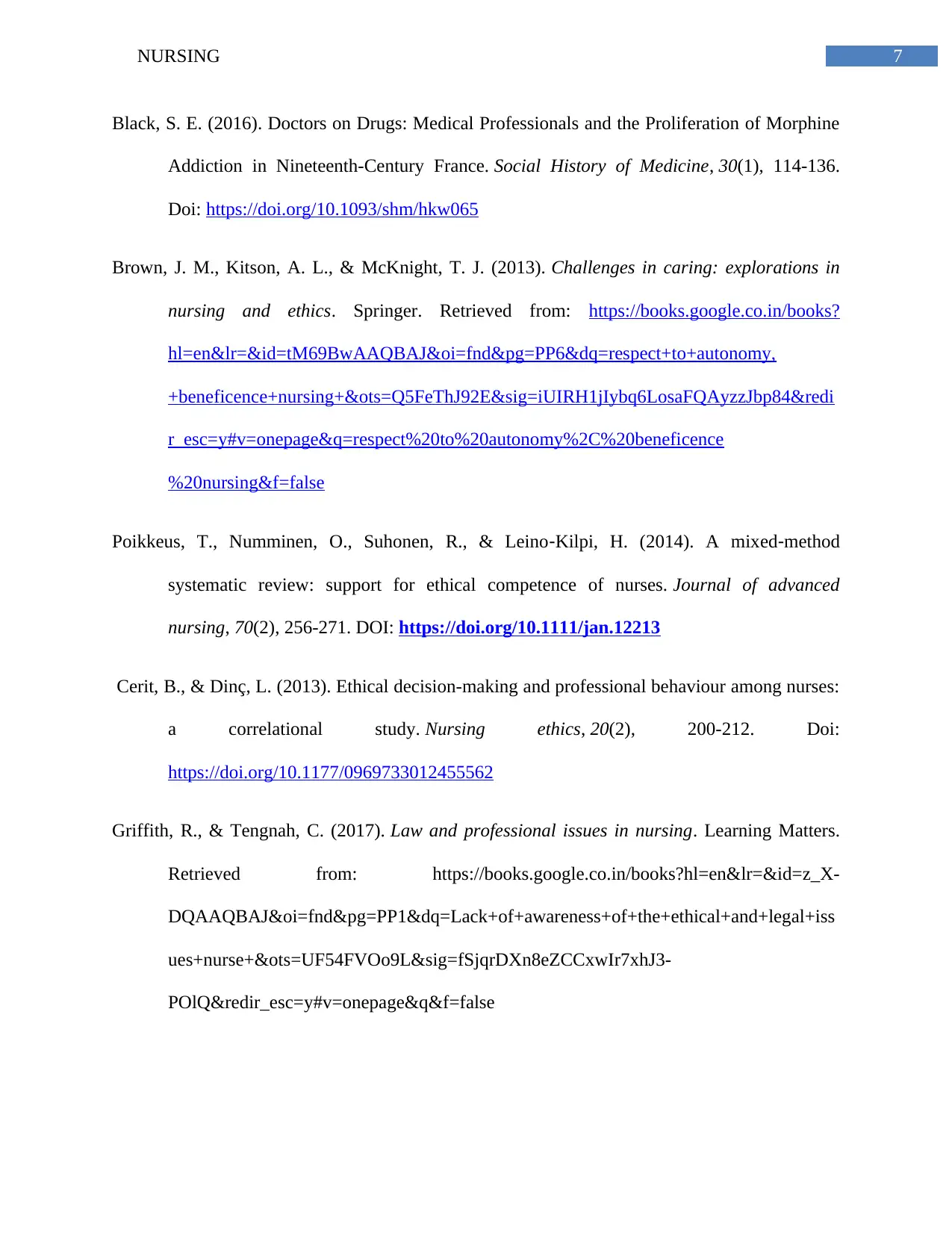
7NURSING
Black, S. E. (2016). Doctors on Drugs: Medical Professionals and the Proliferation of Morphine
Addiction in Nineteenth-Century France. Social History of Medicine, 30(1), 114-136.
Doi: https://doi.org/10.1093/shm/hkw065
Brown, J. M., Kitson, A. L., & McKnight, T. J. (2013). Challenges in caring: explorations in
nursing and ethics. Springer. Retrieved from: https://books.google.co.in/books?
hl=en&lr=&id=tM69BwAAQBAJ&oi=fnd&pg=PP6&dq=respect+to+autonomy,
+beneficence+nursing+&ots=Q5FeThJ92E&sig=iUIRH1jIybq6LosaFQAyzzJbp84&redi
r_esc=y#v=onepage&q=respect%20to%20autonomy%2C%20beneficence
%20nursing&f=false
Poikkeus, T., Numminen, O., Suhonen, R., & Leino‐Kilpi, H. (2014). A mixed‐method
systematic review: support for ethical competence of nurses. Journal of advanced
nursing, 70(2), 256-271. DOI: https://doi.org/10.1111/jan.12213
Cerit, B., & Dinç, L. (2013). Ethical decision-making and professional behaviour among nurses:
a correlational study. Nursing ethics, 20(2), 200-212. Doi:
https://doi.org/10.1177/0969733012455562
Griffith, R., & Tengnah, C. (2017). Law and professional issues in nursing. Learning Matters.
Retrieved from: https://books.google.co.in/books?hl=en&lr=&id=z_X-
DQAAQBAJ&oi=fnd&pg=PP1&dq=Lack+of+awareness+of+the+ethical+and+legal+iss
ues+nurse+&ots=UF54FVOo9L&sig=fSjqrDXn8eZCCxwIr7xhJ3-
POlQ&redir_esc=y#v=onepage&q&f=false
Black, S. E. (2016). Doctors on Drugs: Medical Professionals and the Proliferation of Morphine
Addiction in Nineteenth-Century France. Social History of Medicine, 30(1), 114-136.
Doi: https://doi.org/10.1093/shm/hkw065
Brown, J. M., Kitson, A. L., & McKnight, T. J. (2013). Challenges in caring: explorations in
nursing and ethics. Springer. Retrieved from: https://books.google.co.in/books?
hl=en&lr=&id=tM69BwAAQBAJ&oi=fnd&pg=PP6&dq=respect+to+autonomy,
+beneficence+nursing+&ots=Q5FeThJ92E&sig=iUIRH1jIybq6LosaFQAyzzJbp84&redi
r_esc=y#v=onepage&q=respect%20to%20autonomy%2C%20beneficence
%20nursing&f=false
Poikkeus, T., Numminen, O., Suhonen, R., & Leino‐Kilpi, H. (2014). A mixed‐method
systematic review: support for ethical competence of nurses. Journal of advanced
nursing, 70(2), 256-271. DOI: https://doi.org/10.1111/jan.12213
Cerit, B., & Dinç, L. (2013). Ethical decision-making and professional behaviour among nurses:
a correlational study. Nursing ethics, 20(2), 200-212. Doi:
https://doi.org/10.1177/0969733012455562
Griffith, R., & Tengnah, C. (2017). Law and professional issues in nursing. Learning Matters.
Retrieved from: https://books.google.co.in/books?hl=en&lr=&id=z_X-
DQAAQBAJ&oi=fnd&pg=PP1&dq=Lack+of+awareness+of+the+ethical+and+legal+iss
ues+nurse+&ots=UF54FVOo9L&sig=fSjqrDXn8eZCCxwIr7xhJ3-
POlQ&redir_esc=y#v=onepage&q&f=false
1 out of 8
Related Documents
Your All-in-One AI-Powered Toolkit for Academic Success.
+13062052269
info@desklib.com
Available 24*7 on WhatsApp / Email
![[object Object]](/_next/static/media/star-bottom.7253800d.svg)
Unlock your academic potential
© 2024 | Zucol Services PVT LTD | All rights reserved.



